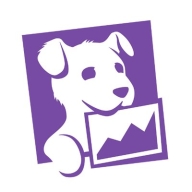

Datadog and Seq compete in log management and monitoring. Datadog holds an advantage with its comprehensive monitoring capabilities, while Seq attracts teams prioritizing precision in log querying and analysis.
Features: Datadog offers extensive monitoring capabilities, robust dashboards, and real-time alerts. Seq provides seamless querying, deep log analysis, and structured log data management.
Ease of Deployment and Customer Service: Datadog is cloud-based, ensuring quick deployment and broad customer support. Seq, as a self-hosted option, requires more initial effort but allows for customization and control.
Pricing and ROI: Datadog has a scalable cost structure linked to service usage, delivering strong ROI. Seq offers cost-effectiveness for organizations primarily focused on log management, providing high ROI in log analysis.
| Product | Market Share (%) |
|---|---|
| Datadog | 4.5% |
| Seq | 1.0% |
| Other | 94.5% |

| Company Size | Count |
|---|---|
| Small Business | 80 |
| Midsize Enterprise | 46 |
| Large Enterprise | 99 |
Datadog integrates extensive monitoring solutions with features like customizable dashboards and real-time alerting, supporting efficient system management. Its seamless integration capabilities with tools like AWS and Slack make it a critical part of cloud infrastructure monitoring.
Datadog offers centralized logging and monitoring, making troubleshooting fast and efficient. It facilitates performance tracking in cloud environments such as AWS and Azure, utilizing tools like EC2 and APM for service management. Custom metrics and alerts improve the ability to respond to issues swiftly, while real-time tools enhance system responsiveness. However, users express the need for improved query performance, a more intuitive UI, and increased integration capabilities. Concerns about the pricing model's complexity have led to calls for greater transparency and control, and additional advanced customization options are sought. Datadog's implementation requires attention to these aspects, with enhanced documentation and onboarding recommended to reduce the learning curve.
What are Datadog's Key Features?In industries like finance and technology, Datadog is implemented for its monitoring capabilities across cloud architectures. Its ability to aggregate logs and provide a unified view enhances reliability in environments demanding high performance. By leveraging real-time insights and integration with platforms like AWS and Azure, organizations in these sectors efficiently manage their cloud infrastructures, ensuring optimal performance and proactive issue resolution.
Seq is a log storage, analysis, and monitoring tool that is highly praised for its efficient, intuitive interface and powerful search capabilities.
It can handle large volumes of logs and integrates seamlessly with platforms such as .NET and Docker. Its valuable features include customizable dashboards, efficient error analysis and debugging tools, and seamless integration with programming languages and frameworks.
Seq is scalable, performs well, and supports collaboration and team workflows.
We monitor all Log Management reviews to prevent fraudulent reviews and keep review quality high. We do not post reviews by company employees or direct competitors. We validate each review for authenticity via cross-reference with LinkedIn, and personal follow-up with the reviewer when necessary.